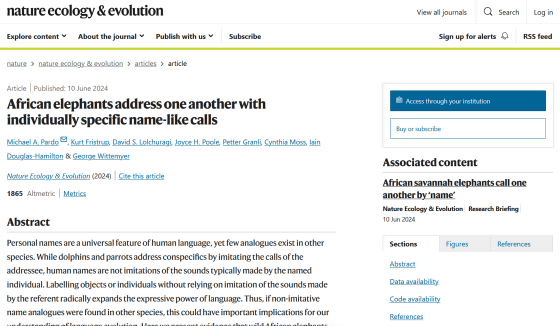Analysis of wild African elephants' calls reveals they call each other by name

Humans call each other by names and nicknames, and sometimes even give names to pets and familiar animals. A new study analyzing the calls of African elephants living in the Kenyan savanna has revealed that wild elephants have their own 'unique names' and use these names to call each other.
African elephants address one another with individually specific name-like calls | Nature Ecology & Evolution

African elephants address one another with name-like calls − similar to humans
https://theconversation.com/african-elephants-address-one-another-with-name-like-calls-similar-to-humans-232096
Elephants call each other by name, study finds | Zoology | The Guardian
https://www.theguardian.com/science/article/2024/jun/10/elephant-names-study-ai
Michael Pardo , a behavioral ecologist at Colorado State University, has been studying wild African elephants for many years and has come to suspect that African elephants call each other using name-like calls. However, no research has examined whether African elephants' calls contain names.
Pardo and his research team used a machine learning model to analyze African elephant calls recorded in the Samburu National Reserve and Amboseli National Park in Kenya from 1986 to 2022, and studied whether the calls contained anything that seemed to be a 'name.'
Many people may imagine a loud 'Paoon' sound when they hear an elephant's cry, but in fact most of the elephant's cry is a 'rumble,' a low-frequency sound that is partially below the range of human hearing. The research team thought that the name was likely included in this rumble, and the analysis was also focused on the rumble.
In the analysis, the machine learning model was given a numerical value that represents the characteristics of each call, and was taught which African elephant each call was directed to. Based on this information, the model learned the patterns of calls directed to specific individuals, and then predicted which individual a call was directed to from other call samples. A total of 437 calls from 99 individuals were used to train the model.

The model developed by the researchers was able to identify the recipient of the calls 27.5 percent of the time, far better than random guessing, suggesting that at least some of the rumbles contain 'name-like elements that can identify the intended recipient.'
However, these results alone are not sufficient evidence that African elephant calls contain names, as we cannot rule out the possibility that each individual making the call has its own unique vocal pattern, and the elephants inferred the individual that received the call based on which individuals they found easiest to talk to.
Pardo and his team then further analyzed the calls and found that even calls from the same African elephant were heard at different levels by different recipients, raising the possibility that there is a unique element to the recipient of the calls, rather than a unique pattern in the individual that made the calls.
In addition, the research team conducted an experiment in which 17 elephants were given calls that were thought to contain their names to see if the elephants could respond to their own names when they heard the calls. You can see the experiment in the video below.
The research team plays sounds that are believed to include the elephant's name from a distance to the elephants.

The elephant responded to the call by spreading its ears wide and flapping them. It certainly seems as if the elephant looked in response to its name. According to the research team, when an elephant hears a call that includes its own name, it approaches the source of the call 128 seconds faster on average, returns the call 87 seconds faster on average, and vocalizes 2.3 times more than when it does not. This result suggests that African elephants can determine that a call is directed at them, even if the call is not related to the context.

African elephants are not the only animals thought to make calls that include their names; in the past, bottlenose dolphins and parrots have also been reported to have 'call signs' to identify individuals. However, in the case of bottlenose dolphins and parrots, they use call signs that imitate the calls of the listener, and it is rare for African elephants to have calls that are not similar to the calls of the listener.
'Interestingly, we found that calls that African elephants make to specific listeners are less similar to the listener's calls compared to calls they make to other individuals. This finding suggests that African elephants may call to each other in the same way that humans do, rather than simply mimicking the calls of other animals,' Pardo said.
The results of this study suggest that African elephants need to identify individuals by name in order to form a complex society, and that African elephants have the ability for abstract thinking. Pardo argued that by studying how African elephants' calls developed, we may be able to get clues about the evolution of human language.
Related Posts:







